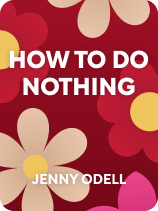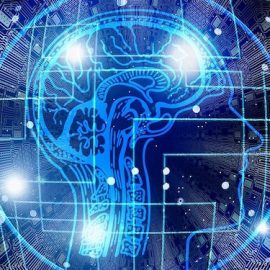

This article is an excerpt from the Shortform book guide to "How to Do Nothing" by Jenny Odell. Shortform has the world's best summaries and analyses of books you should be reading.
Like this article? Sign up for a free trial here.
What is the attention economy? Why is it easier for people to be manipulated these days? Why are people more lonely than ever?
According to Jenny Odell, the harmful modern need to constantly do something derives from capitalism. Using examples from art, history, and her own life, Odell recommends doing “nothing”—devoting time and attention to “non-productive” activities that deepen your connection with the world.
Read more to understand what the “attention economy” is and why you constantly feel pushed to be productive.
The Attention Economy
Odell discusses the problems that doing nothing is meant to solve: the consequences of the attention economy. So, what is the attention economy? It’s the mindset of placing a monetary value on time and attention. Odell explains how the attention economy works and explores its negative impacts.
(Shortform note: The concept of the attention economy was first proposed by 20th-century American psychologist and economist Herbert A. Simon and amounted to a shift in how to understand information. Simon suggested that instead of thinking of information—advertising, media, ideas, and so on—as a scarce commodity sought out by consumers, we should instead think of the attention of consumers as a scarce commodity sought out by information (or the people who create it). This understanding informs many of the economic shifts Odell discusses, as companies changed strategies to adapt to a new, information-rich world.)
How the Attention Economy Works
Odell explains that, in the 1980s, corporate deregulation—the elimination of laws and rules regarding corporate conduct—as well as the loss of labor power allowed the wealthy and major corporations to monetize much larger portions of people’s lives. The cutting of social safety nets and stagnation of wages also put people in a situation where they couldn’t say no to more work or worse working conditions without risking their livelihoods. This economic shift led to a mindset shift: People had to start thinking of their time and attention in terms of monetary value.
(Shortform note: The development of the attention economy also correlates with a general trend in the developed world away from manufacturing and toward a knowledge- and service-based economy. In this new economy, a much larger portion of wealth comes not from concrete things like houses, cars, or oil but from intangible things like data or intellectual property. This is important because while tangible things are limited in supply, intangible things aren’t—for instance, unlike cars, computer files can be endlessly reproduced at little to no cost. But while supply is nearly limitless, demand is not. Therefore, success in this new economy requires getting attention to create demand.)
The Monetization of Time
The increased monetization of time, Odell explains, means people are almost always “on” in some way. Over the past several decades, the line between when people are and are not working has grown blurrier. More jobs are temporary gigs or rely on self-promotion, meaning people have to use their time not only to do work but also to ensure they have more work to do in the future.
(Shortform note: The increased monetization of time doesn’t necessarily mean people are getting paid more for all the time they’re “on.” In fact, with the rise of gig and remote work, unpaid overtime has risen sharply over the last few decades—time when workers are doing work-related tasks but not getting paid. This can mean constantly keeping an eye on their email inboxes, taking urgent after-hours work calls, or simply blurring the lines between when they’re on or off work.)
The Monetization of Attention
Odell suggests that the internet and social media have increasingly monetized attention. The internet generates more money than ever through pay-per-click ads, donations, sponsorships, and so on. And with the vast amount of information available on the internet, people have to compete to be noticed, and some use social or psychological manipulation to try and boost engagement. Even if you aren’t trying to garner attention of your own online, simply using the internet and social media means facing hordes of people clamoring for your attention, many of whom are manipulating you to try and boost engagement.
(Shortform note: Over the past decade or so, there’s been a shift in the monetization of attention as more online businesses move from pay-per-click (PPC) advertisements on free content to subscription services, sponsored content, and content behind paywalls. This also means a change in strategy, as subscription services are less concerned with the views on each individual piece of content and more concerned with maintaining their existing customer base. But while this might lessen the constant demands for consumer attention, it won’t stop attention from being monetized—especially as more subscription services compete with one another.)
Consequences of the Attention Economy
Odell explains that the attention economy has two main consequences: loss of context and social atomization.
1) Loss of Context and Depth
Odell explains there’s no room for context and depth in the attention economy. Learning about the intentions and complexities behind an action, statement, or viewpoint requires a lot of time and probably won’t get very much attention. On the other hand, broader, shallower, and context-free actions, statements, and viewpoints take little time to produce and get a lot more attention. For example, people tend to present generalized versions of themselves on social media, or they use “clickbait” designed to generate outrage—both of which forgo a nuanced perspective in favor of something more marketable.
Without context and depth, people are more easily misled and manipulated. They lack a full understanding of a given situation, and so they’re more likely to go with the most obvious or most popular interpretation, whether or not it’s actually true. For example, Shirley Sherrod, a US Department of Agriculture official in the Obama administration, was asked to resign when a portion of a speech she gave decades earlier was posted online without context to make it seem like she was biased against white people.
(Shortform note: Many authors and academics have noted a shift in society away from context and depth, though they disagree on what’s causing this change. While Odell points to technological and economic changes, others suggest it’s because poor education leaves people without the skills to think deeply or because of a general lack of technological and media literacy.)
2) Social Atomization
The attention economy also leads to social atomization, or people becoming disconnected from one another and their communities, explains Odell. Since people are “always on,” they have less time to devote to nurturing connections with the people around them. In addition, succeeding in the attention economy requires people to constantly advocate for or “market” themselves through things like self-promotion or networking. This leads them to see each other as customers, or potential sources of monetary value, rather than as friends and community members.
Atomization has contributed in large part to the modern era’s epidemic of loneliness and lack of meaning in life, explains Odell. It also hampers social and political activism—when people lack deep connections with one another, it’s more difficult to organize them in pursuit of a specific goal.

———End of Preview———
Like what you just read? Read the rest of the world's best book summary and analysis of Jenny Odell's "How to Do Nothing" at Shortform.
Here's what you'll find in our full How to Do Nothing summary:
- Why we always feel the need to be doing something
- Why you should devote time to non-productive activities
- How to engage with the world in a deeper, more satisfying way






